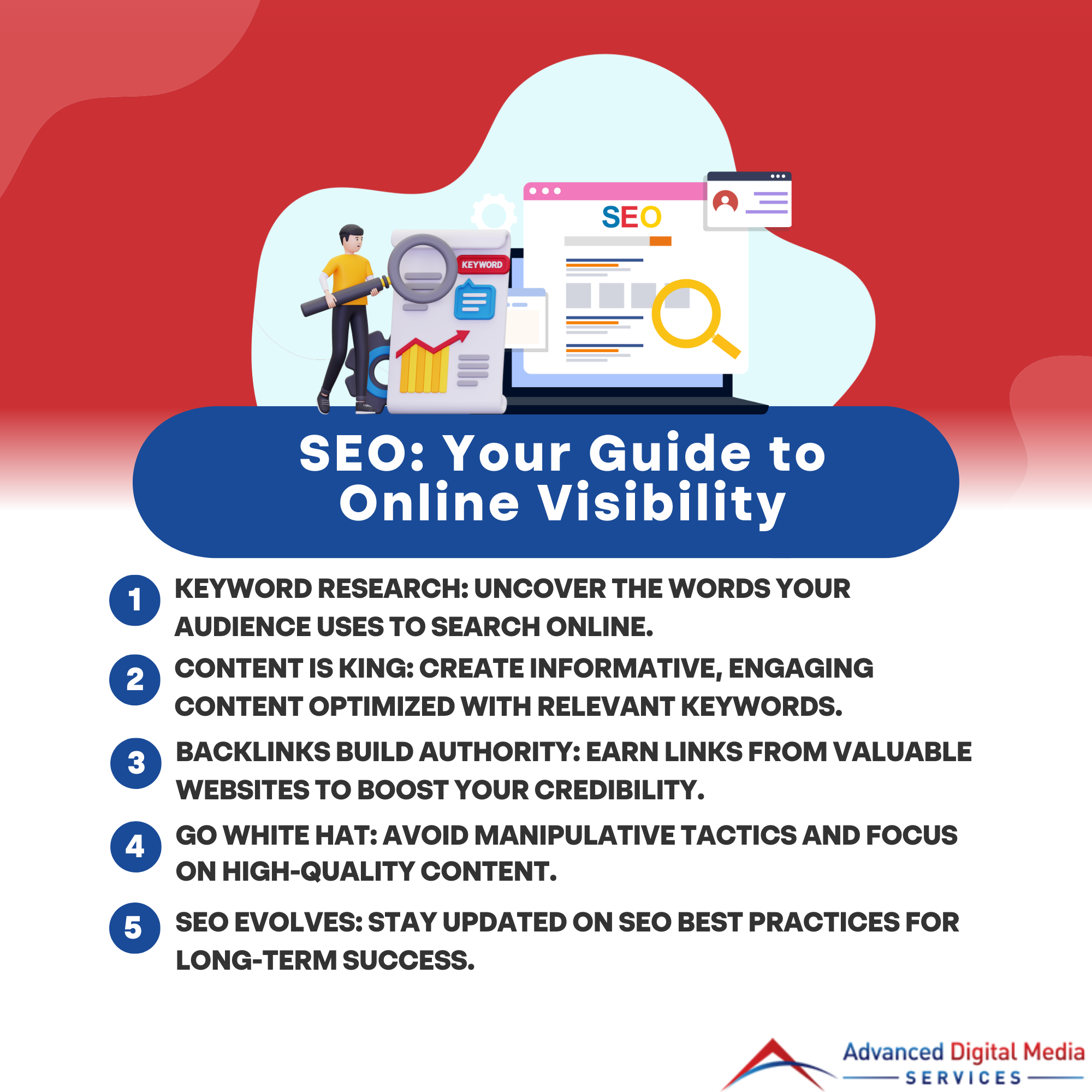Welcome to the exciting world of SEO, where digital presence reigns supreme! This guide delves into the concept of SEO, a fundamental building block for online success. We’ll explore what SEO is, what SEO marketing is in action, and how to optimize your website for higher search engine rankings.

Understanding SEO: Demystifying the Search Engine Jargon
Search Engine Optimization (SEO) refers to the techniques used to improve a website’s visibility on search engines. Implementing SEO strategies can attract potential customers who are actively searching for products/services. SEO techniques aim to enhance website appeal to search engines, leading to better search result rankings. Think of it as a giant neon sign for your website, making it easier to find among the vast sea of online content. The importance of SEO cannot be overstated. It’s the driving force behind attracting organic traffic (visitors who find you through search engines, not paid ads) to your website, significantly increasing the possibility of conversions (turning those visitors into customers).
SEO Marketing: Unveiling the Organic Powerhouse
So, what exactly is SEO marketing? It’s the process of fine-tuning your website to achieve greater visibility in the organic (non-paid) search engine results. This is a vital element of every digital marketing plan. By implementing effective SEO practices, you can climb the search engine rankings ladder, grabbing the attention of potential customers exactly when they’re looking for what you offer. The next time someone asks, “What is SEO marketing?” you can confidently explain that it’s the art and science of optimizing a website to be seen by more people on search engines.
Conquering the Search Engine Landscape: How to Do SEO
Let’s dive into practical SEO implementation now that we understand the fundamentals. Here are three key pillars to focus on:
Keyword Research: Uncovering the Language of Your Audience
Proper keyword research is fundamental to the success of any SEO strategy. It’s like discovering the secret language your target audience uses to search online. Imagine you run a bakery. A high-volume keyword might be “bread,” but it’s incredibly competitive. Using a long tail keyword like “best sourdough bread recipe” targets people explicitly looking for what you offer. There are many free and paid tools available to help with keyword research. Google Ad Keyword Planner is a great tool to begin with when conducting keyword research. Ahrefs and SEMrush offer more advanced features for experienced users.
Crafting High-Quality Content: The SEO Content Goldmine
High-quality content is the king (or queen) of SEO. SEO ranks websites higher in their search results if they provide valuable and relevant content that is useful to users. This means your content should be:
- Informative: Packed with well-researched, accurate information that addresses the user’s search intent.
- Engaging: Break up text with headings, subheadings, and visuals to keep readers hooked. Write using a style that is easy to understand, brief, and interesting.
- SEO-Optimized: Naturally integrate relevant keywords throughout your content, but avoid keyword stuffing (unnatural repetition). Optimize title tags and meta descriptions (the snippets users see in search results) and link internally to relevant pages.
Building Backlinks: Earning Credibility and Website Authority
Backlinks serve as an indication to search engines that other websites consider your website valuable. To earn them naturally, create high-quality content instead of using manipulative tactics. Here are some “white-hat” link building strategies:
- Guest Blogging: Write informative guest posts for websites in your niche, including a link back to your website in the author bio.
- Creating Shareable Infographics: Design visually appealing infographics packed with valuable information. Other websites might want to embed them with a credit link back to your site.
- Broken Link Building: Find websites with broken links on pages relevant to your niche. Contact the webmaster and suggest your content as a replacement, earning a valuable backlink.
Beyond the Basics: Exploring Different Facets of SEO
While keyword research, content creation, and backlink building are crucial, there’s more to the SEO story. Here are some additional aspects to consider:
- Black Hat SEO vs. White Hat SEO: It is important to avoid Black Hat SEO tactics that manipulate search engine rankings, such as keyword stuffing and cloaking, which involves showing different content to users and search engines. These tactics can result in penalties from search engines and damage your website’s reputation. Stick to “white-hat” SEO practices that focus on creating valuable content and building trust with search engines and users.
- The Ever-Evolving SEO Landscape: Search engine algorithms are constantly updated. Staying updated with the best SEO practices is essential for long-term success. Resources like Moz and Search Engine Land can help you keep pace with the ever-changing SEO world.
Optimizing Your Website for Success: On-Page vs. Off-Page SEO
Imagine SEO as a two-pronged attack for ultimate search engine dominance. Here’s the breakdown:
- On-Page SEO: This refers to optimizing the elements within your website that you have direct control over. Here are some key on-page SEO factors:
- Website Speed: A slow website frustrates users and gets penalized by search engines. Ensure fast loading times for a smooth user experience.
- Mobile-Friendliness: With the rise of mobile browsing, having a website that adapts seamlessly to smartphones and tablets is essential.
- Image Optimization: Optimize image file sizes and use descriptive alt tags to improve website speed and accessibility.
- Internal Linking: Simplify navigation and aid content discovery for users and search engines with a strong internal linking structure.
Off-Page SEO: This focuses on strategies that happen outside your website but influence its search engine ranking. Backlink building, as discussed earlier, is a major off-page SEO factor. In addition, building brand mentions, social media engagement, and online reputation management all contribute to off-page SEO.
Local SEO: Dominating Your Local Market
If your target audience has a local focus, local SEO becomes especially important. Here are some key strategies:
- Claim and Optimize Your Google Business Profile: This is a free tool from Google that allows you to manage your business profile in search results and Google Maps. Ensure your listing is complete and accurate and includes high-quality photos and customer reviews.
- Local Citations: Online citations refer to the instances where your business name, address, and phone number or NAP are mentioned on the internet. Focus on building citations on local directories relevant to your industry and ensuring your NAP information is consistent across all platforms.
Take Charge of Your SEO Journey
Throughout this guide, we’ve explored various SEO strategies. Here are some CTAs to help you take action:
- Download our Free SEO Keyword Research Checklist! Get started on your keyword research journey with our handy checklist, guiding you through the process of identifying relevant keywords for your target audience.
- Subscribe to our Blog for Ongoing SEO Tips! Get fresh SEO insights and industry updates delivered to your inbox by subscribing to our blog.
- Need Help Implementing an SEO Strategy? Contact Our SEO Agency Today! Don’t feel like tackling SEO alone? Our team of SEO experts is here to help you develop and execute a winning SEO strategy.
Expanding Your Reach Beyond Websites
The power of SEO isn’t limited to websites. Here are some additional platforms to consider:
- YouTube SEO: To make your YouTube videos easier to find, use relevant keywords in the titles, descriptions, and tags.
- E-commerce SEO: Optimize your product listings on platforms like Amazon by including relevant keywords and high-quality product descriptions.
Conclusion: SEO – Your Pathway to Online Success
Remember, SEO is a continuous process requiring ongoing effort and adaptation. However, the rewards of higher search engine rankings, increased website traffic, and, ultimately, business growth make SEO a worthwhile investment.
Ready to embark on your SEO journey? We hope this comprehensive guide has equipped you with the knowledge and actionable steps to take charge of your website’s search engine optimization.
By optimizing your website for search engines, our SEO services in North Ogden, UT, can enhance your online visibility. To get professional help with your SEO strategy, consider contacting a reputable SEO company like Advanced Digital Media Services.
Remember, the importance of SEO cannot be overstated. Understanding the cornerstone of a successful digital marketing strategy is the first step.
Let the SEO games begin!





